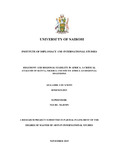| dc.description.abstract | South Africa and Nigeria are often in Africa projected as the dominant powers. But internal structural deficiencies have damaged their capacity to consistently project their power resources geopolitically. According to classical mechanics, when an existing balance of power equilibrium is disturbed, as has in recent years been reflected in the dysfunctional Abuja-Pretoria axis, the system adjusts itself to regain its balance. In practical terms this has mean the emergence of new countries seeking to stake a claim either as regional hegemonies or counterbalances. This paper uses the Deutsch-Singer model of polarity to make a case for a tripolar system that includes Kenya as a new player, and argues that more powers, not less, make for a more stable African international system | en_US |

